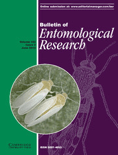
BULLETIN OF ENTOMOLOGICAL RESEARCH
Scope & Guideline
Fostering Interdisciplinary Dialogues in Entomological Research
Introduction
Aims and Scopes
- Insect Physiology and Development:
Research on the physiological processes and developmental stages of insects, including hormonal regulation, gene expression, and adaptations to environmental stressors. - Ecological Interactions:
Studies exploring the interactions between insects and their environment, including predator-prey dynamics, mutualism, and the impact of climate change on insect populations. - Pest Management Strategies:
Innovative approaches to insect pest management, including biological control, genetic modification, and integrated pest management (IPM) techniques. - Insect Behavior and Ecology:
Investigations into the behavioral patterns of insects, including mating strategies, foraging behavior, and responses to environmental stimuli. - Genetic and Molecular Studies:
Research involving molecular techniques to understand genetic diversity, resistance mechanisms to pesticides, and the role of symbionts in insect biology. - Biodiversity and Conservation:
Studies focused on the biodiversity of insect species, their ecological roles, and conservation strategies to protect threatened species and ecosystems.
Trending and Emerging
- Climate Change Impact on Insects:
Research examining how climate change affects insect behavior, distribution, and population dynamics is increasingly prominent, reflecting global environmental concerns. - Molecular Techniques in Entomology:
The use of advanced molecular biology techniques, including CRISPR and transcriptomics, is on the rise, enhancing the understanding of genetic factors influencing insect physiology and resistance traits. - Integrated Pest Management (IPM) Innovations:
There is a growing focus on developing and promoting integrated pest management strategies that combine biological, chemical, and cultural controls for sustainable agriculture. - Ecological Modeling and Predictive Studies:
Emerging interest in ecological modeling to predict insect population dynamics and interactions under various environmental scenarios is evident in recent research. - Beekeeping and Pollinator Health:
Research dedicated to understanding honey bee health, behavior, and the impact of environmental factors on pollinator populations is trending, highlighting the importance of pollinators in ecosystems. - Insect-Plant Interactions:
Studies exploring the intricate relationships between insects and plants, particularly in the context of herbivory and plant defense mechanisms, are gaining traction.
Declining or Waning
- Traditional Insect Collection Methods:
There has been a noticeable decline in studies relying solely on traditional insect collection and identification methods, as newer molecular and ecological approaches gain prominence. - Insect Systematics Based on Morphology Alone:
Research focused primarily on morphological traits for insect classification is waning, likely due to the increasing adoption of molecular techniques that provide more comprehensive insights into phylogenetics. - Single-species Focus Studies:
There is a trend away from studies that examine single insect species in isolation, with a shift towards multi-species interactions and ecosystem-level investigations. - Historical Ecological Studies:
Research that primarily focuses on historical ecological data without integrating contemporary ecological challenges or modern methodologies is becoming less common. - Conventional Pest Control Methods:
As integrated pest management strategies evolve, conventional methods based solely on chemical control are being overshadowed by more sustainable and ecological approaches.
Similar Journals

JOURNAL OF INSECT SCIENCE
Fostering Innovation in Insect ResearchJOURNAL OF INSECT SCIENCE, published by OXFORD UNIV PRESS INC, stands as a pivotal platform in the field of insect science, offering open-access research since 2001. With an impactful presence in the academic community, this journal spans the convergence of entomology and various interdisciplinary studies, establishing itself in the Q2 quartile for both Insect Science and Medicine (miscellaneous) categories as of 2023. This esteemed journal is recognized for its contributions to the understanding and management of insect biology, ecology, and their implications for agriculture and human health, garnering a Scopus rank of 44 out of 181 in Agricultural and Biological Sciences. The Open Access model encourages wide dissemination of knowledge, making the rich repository of research accessible to a global audience. With ongoing publications until 2024, JOURNAL OF INSECT SCIENCE serves as an essential resource for researchers, professionals, and students seeking to deepen their understanding of the crucial role insects play in our ecosystem.
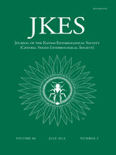
JOURNAL OF THE KANSAS ENTOMOLOGICAL SOCIETY
Cultivating Understanding of Entomological DiversityJOURNAL OF THE KANSAS ENTOMOLOGICAL SOCIETY, published by the Kansas Entomological Society, serves as a vital platform dedicated to the field of entomology and insect science. With an ISSN of 0022-8567 and an E-ISSN of 1937-2353, this journal has established itself since its inception in 1994, continuing to contribute valuable research up to 2024. Despite its current Q4 categorization in the 2023 Insect Science rankings, it ranks 106 out of 181 in Scopus, representing a significant opportunity for researchers to disseminate their findings in a supportive and engaged community. Although it is not an open-access journal, its commitment to rigorous peer review and relevance in agricultural and biological sciences makes it an essential resource for professionals, scholars, and students alike. The journal's focus on local and regional entomological issues often addresses broader ecological impacts, showcasing the importance of insects in environmental health and agriculture. We invite you to explore the rich tapestry of findings and discussions within this esteemed publication.

EUROPEAN JOURNAL OF ENTOMOLOGY
Empowering researchers with vital entomological knowledge.The European Journal of Entomology, published by the Czech Academy of Sciences, Institute of Entomology, is a pivotal journal in the field of Insect Science. With a solid impact factor and recognized ranking—placed in the Q2 quartile in 2023, and ranked #72 out of 181—this journal offers a platform for researchers and professionals alike to share insightful studies and advancements in entomological research. Since its inception in 1993, the journal has continuously evolved to cover a wide spectrum of entomological disciplines, establishing itself as an essential resource for academia and industry. Although it operates on a subscription basis, the journal ensures accessibility for a broad audience of scholars, students, and enthusiasts eager to stay at the forefront of entomological science. Located in Ceske Budejovice, Czech Republic, this journal not only highlights European contributions but also embraces global perspectives, making it an indispensable reference point in the ongoing exploration of insect biology and ecology.

APPLIED ENTOMOLOGY AND ZOOLOGY
Exploring the vital role of insects in ecological conservation.Applied Entomology and Zoology, published by Springer Japan KK, is a pivotal journal in the field of insect science, with an impressive track record since its inception in 1966. This esteemed publication, bearing ISSN 0003-6862 and E-ISSN 1347-605X, contributes significantly to the understanding of applied entomology, emphasizing research that supports sustainable agricultural practices and the ecological conservation of insects. Ranked in the Q2 category (2023) for Insect Science with a Scopus rank of #65 out of 181, it is recognized for its rigorous peer-review process and high-quality contributions that push the boundaries of our knowledge. Although it does not currently offer open access, the journal remains an essential resource for researchers, professionals, and students eager to advance their understanding of the complex interactions between insects and their environment. With a focus on practical applications, it aims to bridge the gap between entomological research and real-world implications, fostering innovation and promoting informed decision-making within the scientific community.
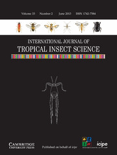
INTERNATIONAL JOURNAL OF TROPICAL INSECT SCIENCE
Connecting Scholars in Tropical Insect ScienceINTERNATIONAL JOURNAL OF TROPICAL INSECT SCIENCE, published by Springer International Publishing AG, is a leading interdisciplinary journal dedicated to advancing knowledge in the fields of insect science and ecology. With its ISSN 1742-7584 and E-ISSN 1742-7592, this journal provides a platform for researchers to publish high-quality, peer-reviewed articles that explore various aspects of tropical insect biology, behavior, and their ecological impacts. As evidenced by its Q3 ranking in both Ecology, Evolution, Behavior and Systematics and Insect Science, it plays a vital role in fostering scientific dialogue and innovation within these disciplines. Researchers affiliated with the journal benefit from its visibility and growing impact, as demonstrated by its Scopus ranks, with a percentile standing of 61st in Insect Science. Although the journal is not open access, it still reaches a wide academic audience, making significant contributions to our understanding of tropical ecosystems. Situated in Switzerland, this journal is crucial for students, professionals, and researchers invested in the intersection of entomology and ecological science.
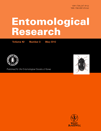
ENTOMOLOGICAL RESEARCH
Unraveling the Mysteries of EntomologyENTOMOLOGICAL RESEARCH, published by Wiley, is a prominent journal within the field of Insect Science, with a significant focus on advancing our understanding of entomological studies, including pest management, biodiversity, and ecological impacts of insects. Since its inception in 2007, the journal has served as a vital platform for researchers and practitioners to publish high-quality, peer-reviewed articles that contribute to the growing body of knowledge in this essential discipline. With an H-index illustrating its citation impact and its classification in the 2023 Scopus quartile rankings at Q3, ENTOMOLOGICAL RESEARCH ranks 69 out of 181 journals in its field, positioning itself within the 62nd percentile, which underscores its relevance and contribution to agricultural and biological sciences. Although it does not offer Open Access, the journal remains committed to ensuring that its content reaches the widest possible audience, supporting ongoing discoveries and innovations in insect science. For researchers, professionals, and students seeking to remain at the forefront of entomological advancements, ENTOMOLOGICAL RESEARCH is an indispensable resource.

ENVIRONMENTAL ENTOMOLOGY
Pioneering Research at the Intersection of Insects and EcologyENVIRONMENTAL ENTOMOLOGY, published by Oxford University Press, is a premier academic journal dedicated to advancing the field of entomology through the lens of environmental science. With the ISSN 0046-225X and E-ISSN 1938-2936, this journal has been a pivotal platform since its inception in 1973, currently converging until 2024. Recognized within the Q2 and Q1 category quartiles, it holds a prominent position, ranking 41st in Insect Science and 225th in Ecology, Evolution, Behavior and Systematics, showcasing its impact and relevance in the scientific community. The journal encompasses a broad scope, covering critical topics related to the interplay of insects and their environments, making it an essential resource for researchers, professionals, and students interested in ecological dynamics and insect biology. Although it does not provide open access, the research published here is vital for those striving to enhance their understanding of ecological systems and the vital roles insects play therein.
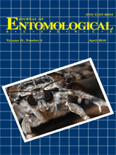
JOURNAL OF ENTOMOLOGICAL SCIENCE
Elevating Entomological Research to New HeightsJOURNAL OF ENTOMOLOGICAL SCIENCE, published by the Georgia Entomological Society Inc, is a crucial resource in the field of insect science and ecology. With a rich history since its inception in 1993, the journal provides a platform for innovative research and comprehensive reviews addressing various aspects of entomology. Although not an open-access journal, it is highly regarded within its community, holding a Q3 ranking in Agronomy and Crop Science, Ecology, Evolution, Behavior and Systematics, and Insect Science as of 2023. Each issue promises to contribute valuable insights to professionals, researchers, and students alike, making it an essential publication for those looking to stay abreast of developments in entomological studies. The journal's editorial commitment ensures that it remains at the forefront of entomological research through rigorous peer reviews and a dedication to scholarly excellence.

Austral Entomology
Exploring the Intricacies of Insect LifeAustral Entomology, published by Wiley, is a leading journal in the field of entomology, specializing in the study of insects within the wider context of agronomy, ecology, and evolutionary biology. With an impact factor that reflects its growing influence and a commendable H-Index, this journal serves a vital role in disseminating cutting-edge research that bridges the gap between basic entomological studies and applied agricultural practices. Since its inception in 2014, Austral Entomology has maintained a strong commitment to open access, fostering a collaborative environment for researchers and practitioners. Recognized within category quartiles Q2 across multiple fields such as Agronomy and Crop Science and Ecology, it ranks impressively among journals in Insect Science, showcasing the significance of its contributions to understanding insect behavior, ecology, and systematics. Given its robust accessibility options, the journal not only enhances the visibility of entomological research but also empowers professionals and students alike to engage with and apply findings in real-world contexts.
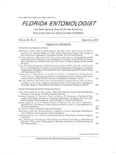
FLORIDA ENTOMOLOGIST
Illuminating the Path of Insect Science and EcologyFLORIDA ENTOMOLOGIST is a prestigious peer-reviewed journal dedicated to the advancement of entomological sciences, published by Walter de Gruyter GmbH. Since its transition to open access in 1994, the journal has become a vital resource for researchers, students, and professionals in the fields of Insect Science and Ecology, Evolution, Behavior, and Systematics. With an impact factor ranking high in its category—Q2 in Insect Science and Q3 in Ecology, Evolution, Behavior and Systematics—the journal showcases significant findings and contributions that shape our understanding of insect biology and its implications for ecological systems. The journal is indexed in Scopus, further establishing its relevance, with current rankings reflecting its competitive standing within Agricultural and Biological Sciences. Published continuously since 1982, FLORIDA ENTOMOLOGIST not only facilitates the dissemination of knowledge among entomologists but also encourages interdisciplinary collaboration, making it an essential publication for anyone invested in the scientific study of insects.